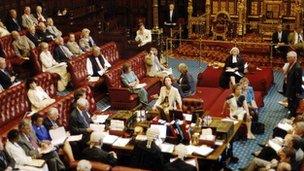Scottish independence: Lords approve referendum order
- Published

Peers debated the section 30 order giving new powers to Holyrood
The House of Lords has unanimously approved the legal transfer of powers to Holyrood to allow it to hold a referendum on Scottish independence.
MPs have already unanimously approved the so-called section 30 order.
Tory peer Lord Forsyth expressed concerns that the transfer of powers should only happen once the exact date and question have been agreed.
The Scottish government wants to hold its Scottish independence referendum in autumn 2014.
The UK government has control of constitutional matters but once the special section 30 order is approved by Westminster powers to hold the historic vote will be handed to Holyrood.
First Minister Alex Salmond's government will then be able to bring forward a referendum bill which will set out the wording of the question; the date of the referendum and the rules of the campaign.
Advocate general for Scotland Lord Wallace of Tankerness, introducing the order to the Lords, told peers: "Scotland's future within this United Kingdom will be the most important decision which we in Scotland take in our lifetime.
"Facilitating a legal, fair and decisive referendum is critical. That is why we consulted on the issue, that is why both the Scottish government and the United Kingdom government spent many hours discussing the process."
But Tory Lord Forsyth, who was Scottish secretary from 1995-97, hit out at the "trust" being put in Mr Salmond.
"The Scottish government can't be a participant and a referee at the same time," he said. He warned power was being given to the Scottish Parliament "but in fact the Scottish Parliament is one man - it is Alex Salmond".
And he warned there was "creeping complacency" in the unionist campaign that was "very worrying".
Former Labour cabinet minister Lord Reid of Cardowan said the government had been "weak" on the question of timing and it was not in the interests of Scotland to delay the election until next year, but he said he was not "frightened of Alex Salmond".
Labour's Lord McConnell of Glenscorrodale, a former first minister, said Lord Forsyth was "wrong even to suggest that we should undermine the agreement between the prime minister and first minister".
But he said putting off the vote until 2014 would be harmful to the Scottish economy for years to come and he pointed to the divisive impact of the referendum on Scotland.
'Not fair'
Replying to the debate Lord Wallace told peers: "I cannot accept that the outcome of the Edinburgh Agreement was a weak one."
And addressing fears the question would be leading, he said the Electoral Commission would have to give an opinion on it.
"If they (the Scottish Parliament) choose to ignore the advice of the Electoral Commission it will come back to haunt them," he said.
Ahead of the Lords debate, Lord Forsyth told the BBC: "What I am saying to the government is look don't you think it might be wise to get from Alex Salmond a clear indication of what the question is and also have the advice from the Electoral Commission as to what they think of this proposed question.
"I think once he [Mr Salmond] has got that power he'll do exactly what he likes and the very last thing that we want is for a referendum where people argue that some aspect of it was not fair."
'Sticks in craw'
Mr Salmond hit back at the peer, saying "we don't need lessons from Lord Forsyth and the unelected House of Lords".
He added: "These people, who are in the last ditch, they cannot stand the idea that Scotland is now in charge of our own destiny - that is basically what sticks in the craw of Lord Forsyth and he and his colleagues, I suspect, will be in the last ditch for some time to come."
The section 30 order will now be sent to the Privy Council, which is a body of senior UK political figures, for final approval.
Speaking after the debate, the Scottish government minister with responsibility for the referendum, Nicola Sturgeon, said: "The Edinburgh Agreement will see the unchallengeable authority to hold Scotland's referendum legally transferred to Holyrood from Westminster.
"The news that the section 30 order required to make this transfer has now passed through both houses and will proceed to the Privy Council is another welcome step along the historic path towards the 2014 vote."